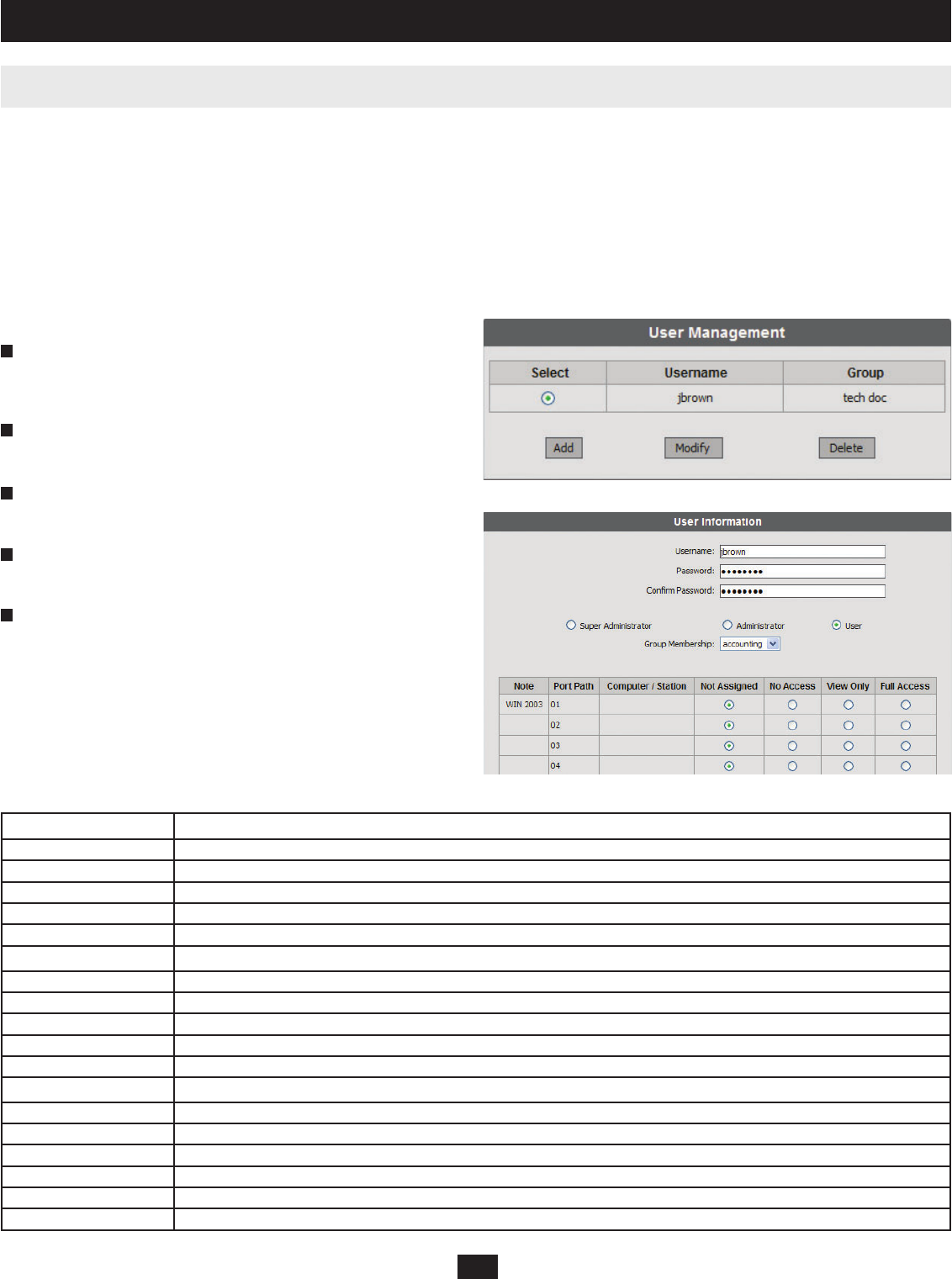
22
10. Administrator Utility
The B060-032-8 requires each user to be added to a group; therefore, we suggest that you create groups before users. If you do not wish to create groups,
you may add users to the default group account (Group); however, the default group account cannot be used to grant KVM port access to group members.
You must individually grant users access to the KVM ports.
Up to 1023 user accounts can be added to the B060-032-8 with no restrictions on the number of any user type. Each user requires a unique user account to
access the B060-032-8 through a KVM console or to use the Administrator Utility. Super Administrators can add, modify, and delete all user types, while
Administrators can add, modify, and delete only other Administrators and Users. (The additional default Super Administrator account (ADMIN) cannot be
modifi ed or deleted, except for the password.) Super Administrators also can log in to the B060-032-8 Administrator Utility and end the session of any user.
The User Management Web Page is similar to the Group Management Web Page. It shows all users that have been created on the B060-032-8 and their
individual group memberships. It also provides options for creating new users and modifying or deleting existing users.
To add users:
From the Administration menu, choose Account Management > User
Management. If no users have been created the No Local Users Web
Page appears. If at least one user has been created the User Management
Web Page appears (Figure 14).
Click New (When in the No Local Users page) or Add (When in the User
Management Page). The User Information Web Page appears
(Figure 15).
Type a name in the Username fi eld. Usernames may be up to 15
characters long. Legal characters include: a–z, A–Z, 0–9, space, hyphen,
square brackets, parentheses, and period.
Enter a password and then reenter the password to confi rm it. Passwords
may be up to 15 characters long. Legal characters include: a–z, A–Z, 0–9,
space, hyphen, square brackets, parentheses, and period.
Select an account type for the user. The following table shows the
permissions for each account type. Note: Only one Super Administrator
at a time can edit Super Administrator settings. If a Super Administrator
attempts to edit settings (in the Administrator Utility or the OSD) while
another Super Administrator is already editing settings, a prompt will
appear notifying them that Super Administrator settings are currently
being accessed.
User type Permissions
User Log In and Out of Administrator Utility and OSD
Access to port(s) for which the User has been granted access rights to
Access View and Settings pages to confi gure personal account settings
Use the Search function
Open the B060-032-8 Help File
Administrator All User permissions
Full access to all ports, including those in cascaded or daisy-chained stations
Create, modify and delete User and Administrator account types*
Manage stations and ports*
View and clear the log fi le*
Back up and restore system confi gurations*
Super Administrator All User and Administrator permissions
Create, modify and delete all user account types*
Create, modify and delete Group accounts*
Confi gure network settings, set date and time, and view system information*
Upgrade fi rmware*
View and end sessions of user account types*
Invoke Broadcast Mode (OSD)*
*These permissions only apply to the station in which the user was originally created (usually the fi rst station).
10.13 User Management
1
2
3
4
5
Figure 14: User Management Web Page
Figure 15: User Information Web Page
